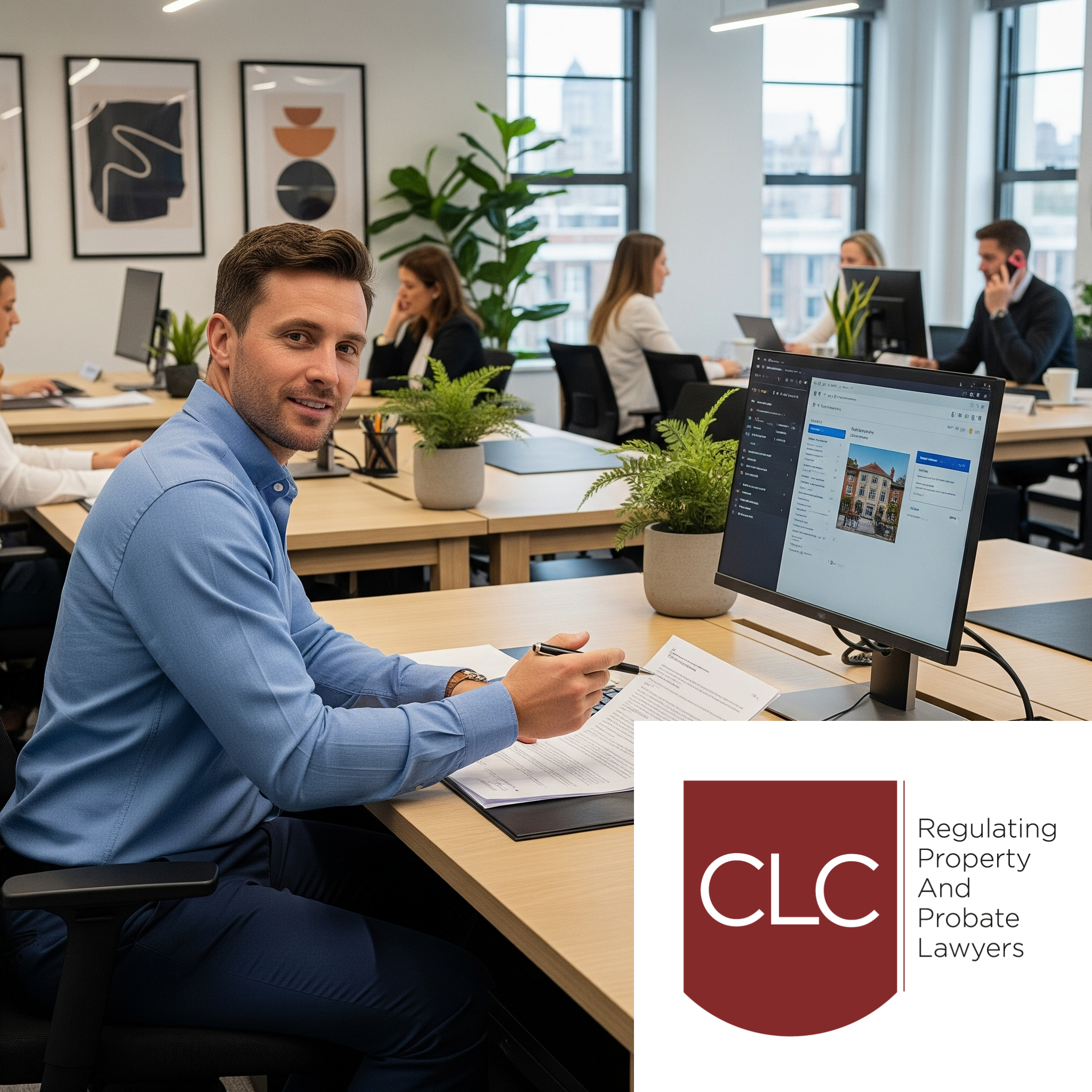Why Choose a Licensed Conveyancer/Probate Practitioner Apprenticeship?
Published: 23 August 2025
This guide will help you compare conveyancing apprenticeships vs diplomas, focusing on the conveyancing technician route, and highlight the key benefits for both learners and legal services employers.
Apprenticeships are a fully CLC-accredited route into a conveyancing or probate career, combining study with paid employment. Whether you’re a career changer, school leaver, existing paralegal, or an employer looking to develop your team, an apprenticeship can be the perfect fit.
No law degree?
No problem. Earn as you learn with our licensed conveyancer and probate practitioner apprenticeships.

What Is a Conveyancing/Probate Apprenticeship?
A Licensed Conveyancer or Licensed Probate Practitioner Apprenticeship is a structured, work-based learning programme that offers a direct path to a professional legal career. It is fundamentally different from a standalone diploma, which is purely an academic qualification. A diploma alone will not qualify you for registration with the Council for Licensed Conveyancers (CLC), as you must also separately acquire 1,200 hours of practical work experience.
In contrast, an apprenticeship provides a seamless journey by combining the conveyancing law and practice academic requirements with the practical experience requirements. Throughout your programme, your training is managed to ensure you meet the CLC's experience standards while completing your academic qualifications. This integration of Level 4 and Level 6 academic study with structured, on-the-job training ensures you gain both the theoretical knowledge and the hands-on skills needed to succeed. Upon completion, you can immediately apply to the CLC to be registered as a Licensed Practitioner.
This model also offers significant benefits for your personal and professional life. The apprenticeship is fully government-funded, meaning you will not incur any private costs. You will complete your studies during work hours, which helps maintain a healthy work-life balance. You also receive dedicated support from an apprenticeship supervisor who monitors your progress, provides additional help, and adapts your training plan as needed. This is a key distinction in the conveyancing apprenticeship vs diploma debate, as the diploma is privately funded, often completed in your own time, and is a more self-driven process requiring a high level of personal discipline.
Level 4 Diploma in Conveyancing Law & Practice
Apprenticeship vs Diploma: Key Differences
When choosing a career path in property or probate law, it's crucial to understand the core differences between a conveyancing apprenticeship vs diploma. While both lead to a rewarding career, their structure and benefits vary significantly.
The most notable difference lies in funding and support. Apprenticeships are fully funded by the government and your employer, meaning you have no upfront costs for your qualification. This allows you to 'earn while you learn'. In contrast, a diploma is typically a self-funded route.
Here's a detailed comparison to help you decide which of the CLC apprenticeship routes is the best fit for you:
Feature | Licensed Conveyancer / Probate Practitioner Apprenticeship | Standalone Diploma (Level 4 or Level 6) |
|---|---|---|
Entry Requirements | Must be employed by a law firm or organisation willing to support the apprenticeship | Open to anyone (no prior legal experience needed for Level 4; Level 6 requires Level 4 or exemptions) |
Study Method | Combine work-based training with CLC-approved academic study (Level 4 + Level 6) | Academic study only - self-directed online learning with tutor support |
Work Experience | Built-in practical experience through your employer (counts towards CLC’s 1,200-hour requirement) | Work experience must be arranged separately to meet CLC licensing requirements |
Funding & Costs | Funded through the government and employer - no cost to the apprentice | Student/self-funded, with flexible instalment payment options available |
Duration | Flexible: 12–24 months per diploma (faster with prior experience or exemptions), with a minimum of 8 months to enable the required practical experience. | Flexible: 12–24 months per diploma (faster with Knowledge Mapping/exemptions) |
Career Outcome | Direct pathway to becoming a Licensed Conveyancer or Licensed Probate Practitioner | Eligible for CLC licensing once both diplomas + 1,200 hours’ experience are completed |
Best For | School leavers, career changers, and employers developing talent pipelines | Independent learners, career accelerators, or those self-funding their qualification |
Conveyancing & Probate Apprenticeships
CLC Conveyancing Diplomas
How Apprenticeships Benefit Employers and Apprentices
Benefits for Employers
Apprenticeships are a strategic investment for law firms, offering a cost-effective way to build a robust and loyal talent pipeline. The benefits of legal apprenticeships in conveyancing for employers are significant:
- Attracting fresh talent: Apprenticeships are a highly appealing route for school leavers, career changers, and others seeking a funded, practical entry into the legal profession.
- Developing loyal, skilled legal technicians: Apprentices are trained directly to your firm’s standards, ensuring they are not only competent but also integrated into your company culture from day one. Their professional recognition as property professionals is a huge asset to your practice.
- Funding incentives: The government provides funding to cover the costs of training and assessment, making it a financially viable option for both levy-paying and non-levy-paying firms.
Access Law Online Ltd can be your trusted partner in navigating these CLC apprenticeship routes. We deliver CLC-approved training that ensures your apprentices are work-ready and an asset to your firm from day one, helping you to fill skills gaps and plan for the future.
Contact UsBenefits for Apprentices
A conveyancing practitioner apprenticeship in the UK offers a wealth of advantages for learners. You get to earn while you learn, eliminating the burden of student debt, which is a key benefit when comparing against university degrees. There's no prior law degree required, making it a highly accessible and funded route into a respected legal career. Furthermore, there is a clear and structured progression from apprentice to a Licensed Conveyancer or Licensed Probate Practitioner, with a deep focus on probate law and practice and conveyancing law and practice.
Our CLC apprenticeship routes are designed to provide a supported and effective learning journey. Our unique selling points include:
- Live tutor support: Receive guidance from seasoned legal experts with real-world experience, ensuring you're never left to navigate complex topics alone.
- Online flexibility: Our programmes are designed to fit around your work commitments, with flexible learning materials and schedules.
- Fully accredited training: Our qualifications are accredited by the CLC, guaranteeing you're on a recognised pathway to becoming a professional.
Is an Apprenticeship Right for You?
The conveyancing practitioner apprenticeship is a versatile and highly beneficial route for a wide range of individuals. It's an excellent pathway for:
- School leavers who want to start their legal career without the burden of university fees and student debt.
- Career changers looking for a structured, supported, and funded way to transition into a new profession.
- Existing legal assistants who want to formalise their skills and gain a recognised qualification to progress in their career.
- Employers who are looking to build a long-term, skilled talent pipeline within their firm.
While apprenticeships are an excellent choice for many, a standalone diploma may be a better option if you prefer a self-funded path with a flexible pace. Explore training providers that can guide you through the apprenticeship standard process.
Our Knowledge Mapping assessment can help you determine which of the CLC apprenticeship routes is the best fit for your unique circumstances and career goals.
Start Your Apprenticeship with Access Law Online Ltd
An apprenticeship is an excellent choice for a fully CLC-approved and funded route into the legal profession. With Access Law Online Ltd, you'll benefit from earning while you learn, online study, and comprehensive support.
We are a trusted provider, giving both learners and employers confidence that our structured training meets the highest standards. We offer a direct pathway to becoming a licensed professional. Compared to a diploma, a level 6 diploma in conveyancing, a conveyancing apprenticeship provides a much more integrated and supportive experience, ensuring you're ready for the workplace, with skills in administration of estates. This makes a probate practitioner apprenticeship in the UK an ideal choice for a serious career.
Take the first step towards becoming a licensed conveyancer or probate practitioner with a fully funded apprenticeship.
Conveyancing & Probate Apprenticeships
Why Choose a Licensed Conveyancer/Probate Practitioner Apprenticeship FAQs
Practical Experience CheckerMore related posts

Conveyancing Apprenticeship vs. Solicitor

CLC Conveyancing: Why Does Accreditation Matter?











